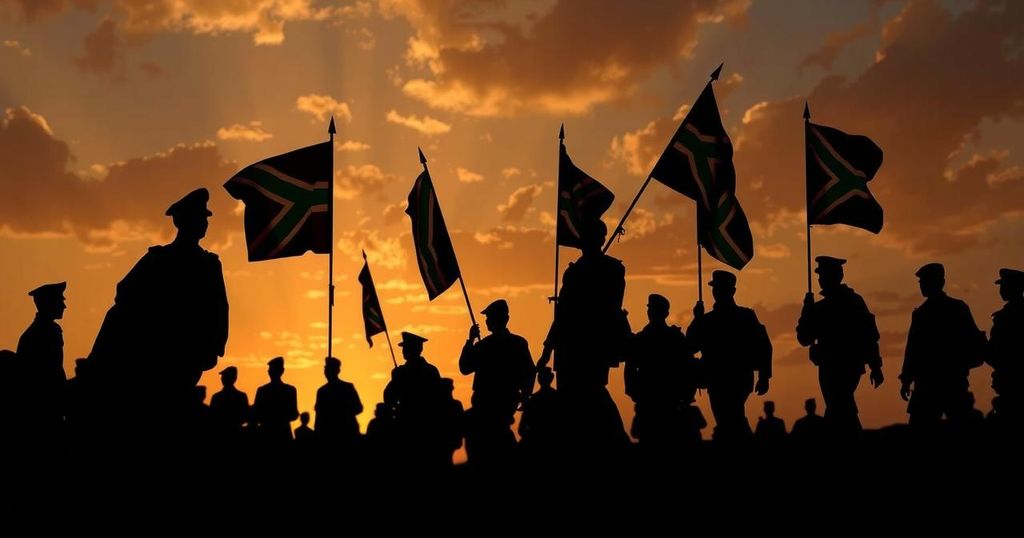Remains of South African Freedom Fighters Repatriated from Zimbabwe and Zambia
The remains of 42 South African freedom fighters, who died during the struggle against apartheid while in exile in Zimbabwe and Zambia, were repatriated to South Africa. This initiative, aimed at providing closure for families and educating future generations about the struggle, culminated in an official reception at Waterkloof Air Force Base. Notable figures among the remains include Duma Nokwe, Florence Mophosho, and Basil February. A homecoming ceremony hosted by President Cyril Ramaphosa is scheduled for Friday.
JOHANNESBURG — The remains of 42 South African freedom fighters, who lost their lives in exile in Zimbabwe and Zambia during the anti-apartheid struggle, were officially repatriated to South Africa on Wednesday, according to government officials. The ceremonial reception took place at Waterkloof Air Force Base in Pretoria, where family members and government representatives gathered to honor these individuals whose brave actions contributed to the country’s liberation. These remains were exhumed in the aforementioned countries as part of a government initiative aimed at providing closure for families who had endured the pain of losing loved ones while they fought against the oppressive apartheid regime. Many freedom fighters had left South Africa to receive military training or to escape imminent arrest, seeking refuge in Zimbabwe and Zambia, which contained robust underground movements, including the African National Congress and the Pan Africanist Congress. Historical context reveals that prior to the dismantling of apartheid in 1994, numerous activists trained abroad with the intention of returning to engage in armed resistance. Notably, the African National Congress, led by figures such as Nelson Mandela, relocated its headquarters to Lusaka, Zambia, following its prohibition in South Africa. Unfortunately, many of these dedicated individuals met their demise away from their homeland, resulting in their burial in foreign territories. Among the remains repatriated were notable figures in the freedom struggle such as Duma Nokwe, Florence Mophosho, and Basil February. During a Heritage Day celebration, Deputy President Paul Mashatile emphasized that this repatriation initiative serves to enlighten future generations about the sacrifices made during the fight against apartheid. “As a national memory project, this initiative aims to commemorate, celebrate, educate, promote, preserve, conserve, and provide a durable testament to South Africa’s road to freedom,” stated Deputy President Mashatile. President Cyril Ramaphosa is scheduled to lead a homecoming ceremony for the returned remains on Friday, which will precede their handover to families for reburial ceremonies throughout the nation. Furthermore, the South African government announced its ongoing efforts to repatriate additional remains from various countries, including Lesotho, Ethiopia, Tanzania, and Angola, among others. Deputy Defense Minister Bantu Holomisa expressed hope that this undertaking would include further victims of the struggle from different nations, stating, “I hope this process will culminate in getting more people in other countries who died under difficult conditions. We welcome them back to connect with their families.”
This article discusses the repatriation of the remains of South African freedom fighters, who were pivotal in the struggle against apartheid. Many of these individuals died in exile in neighboring countries such as Zimbabwe and Zambia while fighting against the oppressive apartheid regime that ruled South Africa prior to its downfall in 1994. The initiative aims to provide closure to the families of those who perished fighting for freedom, as well as to educate future generations about their contributions to the nation’s history.
In conclusion, the repatriation of the remains of these 42 freedom fighters serves as a poignant reminder of the sacrifices made in the fight against apartheid. This initiative not only commemorates their legacy but also aims to foster a deeper understanding among South Africans of their history. The continued efforts of the government to bring home those lost abroad signifies a commitment to honoring these heroes and connecting families to their loved ones once more, ensuring that their memories endure.
Original Source: www.newsday.com




Post Comment